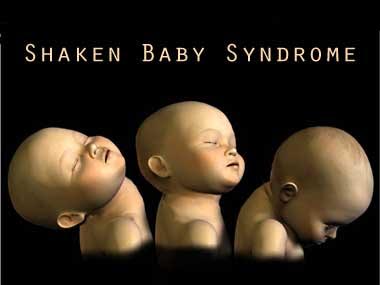- Home
- Editorial
- News
- Practice Guidelines
- Anesthesiology Guidelines
- Cancer Guidelines
- Cardiac Sciences Guidelines
- Critical Care Guidelines
- Dentistry Guidelines
- Dermatology Guidelines
- Diabetes and Endo Guidelines
- Diagnostics Guidelines
- ENT Guidelines
- Featured Practice Guidelines
- Gastroenterology Guidelines
- Geriatrics Guidelines
- Medicine Guidelines
- Nephrology Guidelines
- Neurosciences Guidelines
- Obs and Gynae Guidelines
- Ophthalmology Guidelines
- Orthopaedics Guidelines
- Paediatrics Guidelines
- Psychiatry Guidelines
- Pulmonology Guidelines
- Radiology Guidelines
- Surgery Guidelines
- Urology Guidelines
Soon, a blood test to detect shaken baby syndrome

Washington : A team of scientists has come up with a new medical test that may help identify infants who may have had bleeding of the brain as a result of abusive head trauma, sometimes referred to as shaken baby syndrome.
Developed by the researchers at Children's Hospital of Pittsburgh of UPMC and University of Pittsburgh School of Medicine, the serum-based test, which needs to be validated in a larger population and receive regulatory approval before being used in clinical practice, would be the first of its kind to be used to detect acute intracranial hemorrhage or bleeding of the brain.
Infants who test positive would then have further evaluation via brain imaging to determine the source of the bleeding.
"Abusive head trauma (AHT) is the leading cause of death from traumatic brain injury in infants and the leading cause of death from physical abuse in the United States," said senior author Rachel Berger.
However, approximately 30 percent of AHT diagnoses are missed when caretakers provide inaccurate histories or when infants have nonspecific symptoms such as vomiting or fussiness. Missed diagnoses can be catastrophic as AHT can lead to permanent brain damage and even death.
The researchers collaborated with Axela, a Canadian molecular diagnostics company, to develop a sensitive test that could reduce the chances of a missed diagnosis by using a combination of three bio markers along with a measure of the patient's level of hemoglobin, the protein that carries oxygen in blood.
Axela's automated testing system allowed the researchers to measure multiple biomarkers simultaneously using an extremely small amount of blood, an important characteristic of a test designed to be used in infants.
The test correctly detected acute intracranial hemorrhage because of abusive head trauma approximately 90 percent of the time, a much higher rate than the sensitivity of clinical judgement, which is approximately 70 percent.
"The test is not intended to replace clinical judgement, which is crucial," said Berger. "Rather, we believe that it can supplement clinical evaluation and in cases where symptoms may be unclear, help physicians make a decision about whether an infant needs brain imaging."
The specificity of the test or the ability to correctly identify an infant without bleeding of the brain who would not require further evaluation was 48 percent. The researchers aimed for the test to be highly sensitive rather than maximizing accuracy, since missing a diagnosis has more serious consequences than performing brain imaging in babies without the condition.
"This study illustrates the benefits of being able to perform highly sensitive tests at the point of care," said co-author Paul Smith.
The science behind the test is described in JAMA Pediatrics.

Disclaimer: This site is primarily intended for healthcare professionals. Any content/information on this website does not replace the advice of medical and/or health professionals and should not be construed as medical/diagnostic advice/endorsement or prescription. Use of this site is subject to our terms of use, privacy policy, advertisement policy. © 2020 Minerva Medical Treatment Pvt Ltd